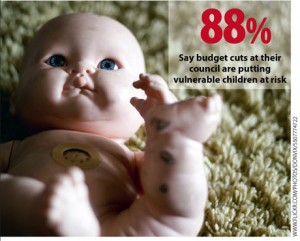I’ve been reading about this proposed “Cinderella Law” outlawing “emotional abuse” of parents of their kids. Apparently it’s going to be in this week’s Queen’s Speech which means it’ll be a key element of the government’s legislative agenda in the last months of the Coalition’s term.
 According to this, supportive, article 1.5 million kids “are thought to be” suffering from emotional abuse – so I guess this law would instantly criminalise over two million adults for not being good enough parents. Of course they wouldn’t arrest two million people.
According to this, supportive, article 1.5 million kids “are thought to be” suffering from emotional abuse – so I guess this law would instantly criminalise over two million adults for not being good enough parents. Of course they wouldn’t arrest two million people.
They’d only arrest the travellers, the different, the poor, those with mental health problems, those from different cultures, and those they’ve just decided they want to arrest. These people would no longer be able to see their kids and would, presumably, be on the offenders’ register – so the implications are significant for them and their children.
Interestingly the current wording proposed “would add a further category of harm for which the perpetrator could be punished for impairment of “physical, intellectual, emotional, social or behavioural development”. ” (from the BBC) I’d like to see a proper working definition of what this might mean in practice. Seeing as theories on “behavioural development” change constantly what bar would behaviour have to pass to become criminal?
I’m assuming the lack of violin lessons and skiing holidays would not be criminal – but what protection is there against creating a crime of being poor with children? At what point do people in difficult situations find themselves criminalised for being in a situation they themselves are trapped in?
Abuse is bad, and so are bad laws.
No one is going to be *for* emotional abuse, but we need to be cautious about allowing emotive arguments to criminalise those who are struggling rather than criminally cruel. We don’t want to create a situation where parents don’t seek help from the authorities for fear of being locked away for not being able to love and protect their kids the way they know they should.
The Telegraph says that parents who “starve their kids of love” will face jail. “This could include deliberately ignoring a child, or not showing them any love, over prolonged periods, damaging a child’s emotional development.” So parents – don’t be depressed, or traumatised or simply not bond well with your child because the law will decide if you loved your children enough. Literally.
I don’t want to overstate this, I’m genuinely interested in reading proposed legal definitions. I’ve got no interest in protecting abusive parents, but I’m also conscious that people are more and more willing to classify things like smoking in the presence of their children as abuse, and I find it difficult to take those people seriously. I don’t want us to criminalise imperfections.
Frank Furedi (recognise the name but can’t place him for the moment) wrote this in the Independent worrying about the proposed changes.
“Campaigners devoted to the criminalisation of emotional abuse have deliberately defined it in an amorphous and expansive manner. According to the different guidelines drawn up on this subject, emotional abuse can refer to virtually every parental failing…
“For example, the NSPCC includes in its definition of emotional abuse the “making of fun” of what a child says or how they communicate. I am not sure what universe the NSPCC inhabits, but in the real world, the making fun of one another is the stuff of family life. When parents and children interact, they are likely to make jokes at each others’ expense…
“The NSPCC claims that emotional abuse “may feature age or developmentally inappropriate expectations being imposed on children”. It contends that emotional abuse may include interactions that are “beyond the child’s developmental capability”. But it can also mean over-protecting a child and limiting their “exploration and learning, or preventing the child participating in normal social interaction”.
“In other words, just about anything that is not middle-of-the road, unimaginative child-rearing is a potential quarry”.
Not only does it look like a socially authoritarian law that can be used to criminalise those who are not living the typical life, the traditional way, those who insufficiently embody the cultural mores of the southern middle classes. Not only that but also criminalise them for child abuse – something that many of us would, understandably, feel uncomfortable to publicly defend even when grossly misapplied or results in real, tragic injustices.
Right now I’m tending to be against it. Feel free to show me that the arguments for are not all emotive, knee jerk tosh – although I should warn you that attempting to convince me that abuse is bad is a task already won, so no need to waste your time on that, where I need convincing is that this law will solve more injustices than it causes.
